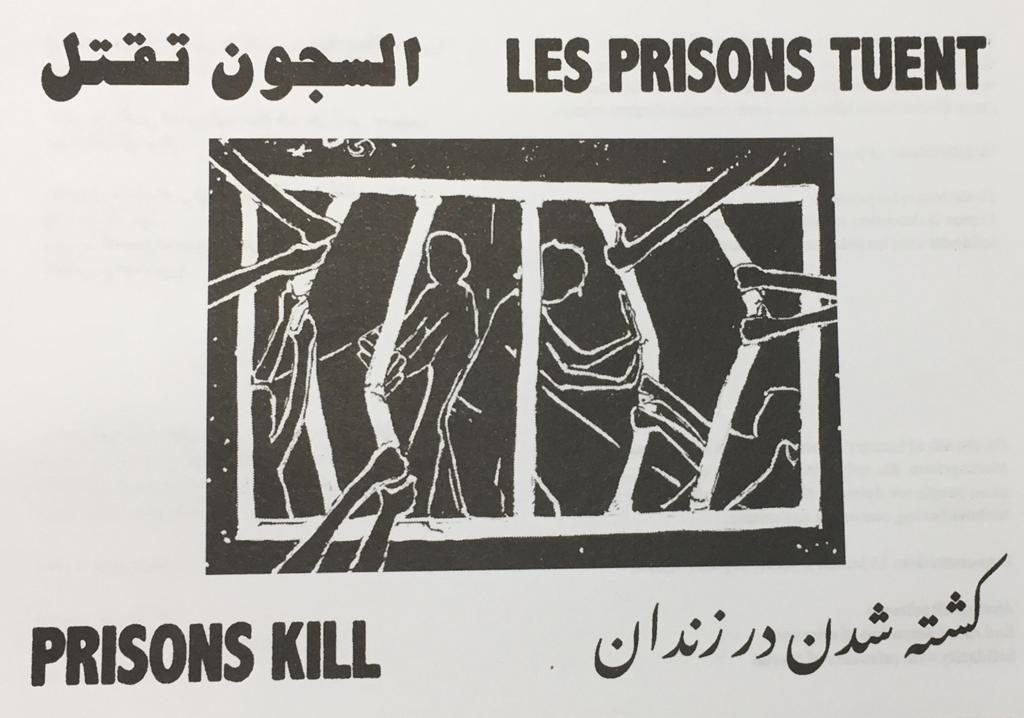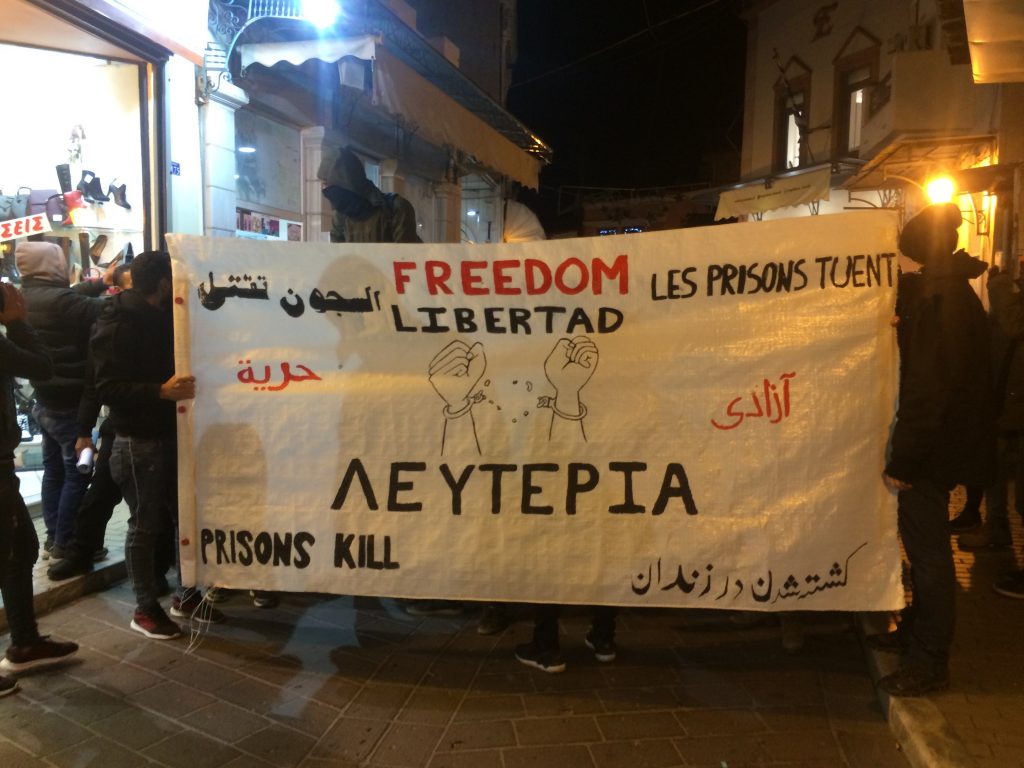On 6 January, an asylum seeker was found dead, hung in an isolated cell in the detention centre of Moria camp. He came to Europe to seek protection, but he was arrested and detained in the so-called pre-removal centre, although he suffered from serious mental health problems. He did not receive any medical treatment and was for two weeks isolated from the other detainees until he was found dead one morning.
While the Greek government is working on drastically expanding incarceration policies, arresting asylum seekers directly after their arrival, and recently announcing to build closed camps, this death shows again the senselessness and cruelty of the detention of asylum seekers, driving people to desperation and in some cases even death.
The death provoked a big demonstration on 18th of January in Mytilene. Refugees – some of them who had survived the Greek incarceration system – and members of the solidarity community from different countries marched through the town and wrote a common statement that was read out in several languages. It describes the necropolitical system of incarceration of Europe’s “undesirable” and testifies of drastic abuses, including police violence:

On 6 January a 31-year-old man was found dead, hung in a cell inside the Pre Removal Detention Centre (PRO.KE.K.A.), the prison within Moria camp. Police knew before they detained him that he had serious mental health issues. Despite this, for approximately two weeks prior to his death he was kept in solitary confinement. His death is on the hands of the police and the Greek state.
Within this PRO.KE.K.A. prison, those that are held there are the “undesirables” of the European Union and the Greek State: the majority are arrested and held there immediately upon arrival, based only on their nationality. Others are considered ‘public security threats’ but they have never been tried or convicted. Others have had their asylum cases rejected, but they were judged in an unfair asylum system built to exclude migrants from Europe and maintain a marginalized exploitable population.
This policy of collective punishment is commonly reproduced in courts and the media, which criminalize migrants and categorizes them as having a ‘low refugee profile’ before anything is even known about them individually. This concept of a ‘low refugee profile’ is implemented in PRO.KE.K.A. in Lesvos and Kos, through a pilot project. Those who come from countries where, statistically, less than 25% are recognized as refugees, are detained upon arrival from Turkey. This is mainly people from African states. Single men from these countries are arrested upon arrival and detained for three months. The new asylum law allows for increasing detention time for up to 18 months.
PRO.KE.K.A. prison is designed to drive migrants to desperation. It operates with little oversight and with no accountability. There, people are held with limited access to legal, medical or psychological support. The system is designed to keep them afraid and isolated, to grind them down, and demonstrate daily that they are not welcome in Europe, until they submit to their own deportation rather than resist it. Those who fight back against detention and deportation are violently dealt with, and sometimes end up in the hospital.
Monitoring groups, lawyers and prisoners have described prison conditions as amounting to ‘inhuman and degrading treatment’. People are detained in overcrowded cells 22h a day. Psychological and physical abuse is common. People are woken up at random hours of the night using noise and light. They are forced to spend two hours outside each day, even in the winter. They are taken to where there are no cameras and beaten by the police, and beaten by the police while in handcuffs. People are granted access to their phones only at weekends, cutting them off most of the week from their families and support networks, and making communication with legal support almost impossible. Visits from friends and family are prohibited. Because of these reasons, reporting abuse is practically impossible. Also many fear retaliation by the police and do not trust government or official organizations because they see abuse continue with no consequences for the police, even though the abuse happens under everyone’s eye.
Almost no basic need is met. No adequate warm clothing, and only one blanket, meaning they must freeze in the winter months. Without interpreters present, detainees have limited means of communicating with prison officers, meaning that many do not know why they are detained or for how long. The food is inadequate and unhealthy, with many going hungry. At times, only one meal a day is served, and no food can be brought in from contacts outside. They are provided no basic hygiene products like soap or toothpaste, and outbreaks of scabies have occurred.
The asylum claims of those detained in PRO.KE.K.A. are processed at breakneck speed, behind closed doors where due process is ignored, and access to legal aid is severely limited. Legal aid on appeal is routinely denied, despite having a right to a lawyer. Trapped in prison, detainees face huge difficulties submitting evidence to the asylum service to support their claims.
The illegal detention of minors is commonplace because European Border Agency FRONTEX is systematically registering minors as adults. Torture survivors are also commonly detained despite an obligation by the state to screen for any vulnerabilities. Those with serious medical and psychological conditions are routinely denied access to healthcare. For example people with prescription medicine are not provided with this medication, even if they had it on their person when arrested. When people ask to see a doctor or psychologist, the police and AEMY pass responsibility between each other and often people are never treated. Self harm is tragically common in PRO.KE.K.A.. At times, those with severe illnesses have been detained and deported by police and FRONTEX to Turkey, under the knowledge of UNHCR.
Here in PROK.E.K.A. is where the man who died found himself in December 2019, when he was taken into detention. His case fell into a familiar pattern in the Aegean islands. Police were aware that he was mentally ill, state protection agencies then denied responsibility for his wellbeing or provided no care at all, leaving him knocking on one closed door after another.
According to other people detained in PRO.KE.K.A., he spent just a short time with other people, before being moved to isolation for approximately two weeks. While in solitary confinement, even for the hours he was taken outside, he was alone, as it was at a different time than other people. For multiple days he was locked in his cell without being allowed to leave at all, as far as others detained saw. His food was served to him through the window of his cell during these days. His distressed mental state was obvious to all the others detained with him and to the police. He cried during the nights and banged on his door. He had also previously threatened to harm himself. Others detained with him never saw anyone visit him, or saw him taken out of his cell for psychological support.
Healthcare in the prison is run by AEMY, a private institution supervised by the Greek Ministry of Health. The Greek state is its sole shareholder. Its medical team supposedly consists of one social worker and one psychologist. However, the social worker quit in April 2019 and was never replaced. The psychologist was on leave between 19 December and 3 January. The man was found dead on 6 January meaning that there were only two working days in which AEMY was staffed during the last three weeks of his life, when he could have received psychological support. This is dangerously inadequate in a prison currently holding approximately 100 people. KEELPNO is the only other state institution able to make mental health assessments, yet it has publicly declared that it will not intervene in the absence of AEMY staff, not even in emergencies, and that in any case it will not reassess somebody’s mental health.
If we believe that this individual took his own life in order to escape from the abyss of PRO.KE.K.A., then it was the result of prison conditions that push people to despair, and the failure of multiple state agencies to provide him obligated mental health care.
Having claimed that too many migrants have escaped detection, New Democracy has vowed to pour money into more police and new prisons in order to find, reject and deport those deemed ineligible for asylum as quickly as possible, no matter the human cost. The new asylum law also provides for increased use of detention and for extended time periods. Migrants are left in a cycle of discrimination, deprivation and death.
This logic has killed before. The multiple deaths from the cold, fires in the overcrowded camps, and denial of health care, are all the result of Europe’s conviction that migrants should not be here, and that their lives here should be made so intolerable that they leave. For each death nobody is held to account, and there is no transparency following deaths. Agencies point fingers at each other in a circle of blame. Investigations whitewash preventable deaths as deaths of natural causes. Migrants are blamed for creating their own dangerous living conditions.
One death is too many.
• We call for an independent investigation into the circumstances surrounding the death on 6 January.
• We call for the closing of PRO.KE.K.A. and the immediate release of all those detained.
• We stand in solidarity with everyone detained in similar circumstances; from the dark cells of Korydallos to Petrou Rally, the passion of liberty will abolish all prisons.
• We call for freedom of movement for all.


